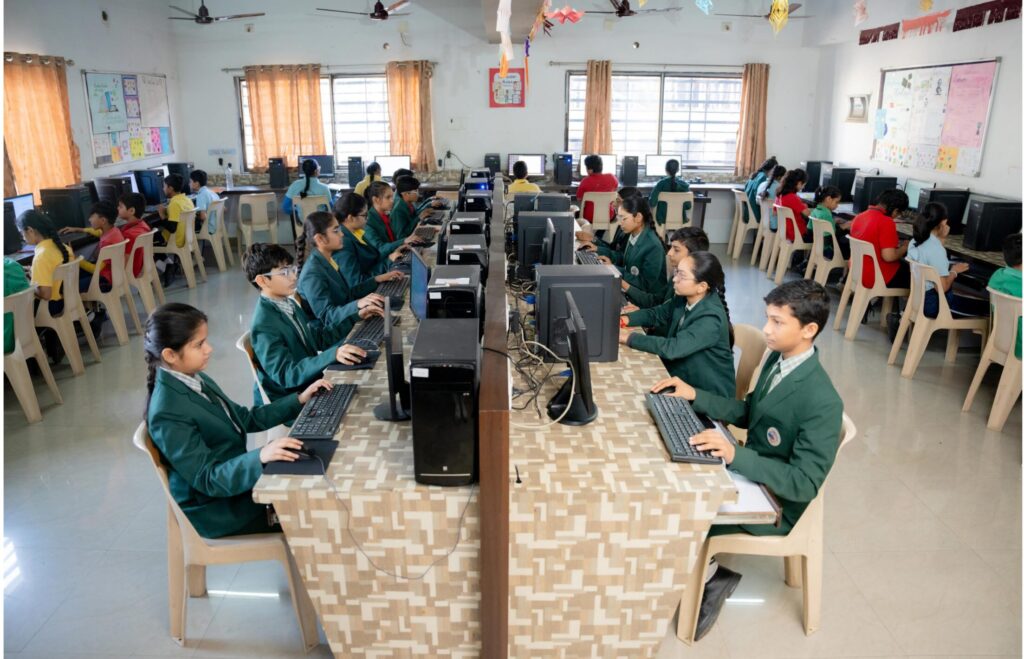1st ICSE School in Jamnagar

High School
Teaching Methodolgy
- English (Language & Literature)
- Mathematics
- Science (Physics, Chemistry, Biology)
- Social Studies (History, Civics, Geography)
- Computer Applications
- Second Language (Hindi, Sanskrit, Regional Languages)
- Art, Music, Physical Education & Life Skills

English (Language & Literature)
Grammar:
• Grammar is Taught in context (through reading passages instead of isolated rules).
• Conducting error analysis exercises for better retention.
• Using games, quizzes, and interactive worksheets.
• Practice-based learning (e.g., sentence correction, transformation exercises).
Writing Skills:
• Focus on structured writing (essays, letters, reports, and creative writing).
• peer review sessions for editing and feedback.
• Newspaper & Magazine Writing: Assigning real-world topics for essays.
Literature (Poetry, Drama, Prose):
• Role-playing & dramatization (for Shakespearean plays and prose stories).
• Theme-based discussions to enhance critical thinking.
• Creative interpretation tasks (e.g., rewrite an ending, script adaptation).
Assessment Techniques:
• Comprehension-based MCQs, short & long answer questions
• Oral presentations & debates to test speaking skills
• Creative writing assignments & peer assessments.

Mathematics
Conceptual Learning:
•We Use visual aids & manipulatives (e.g., algebra tiles, geometric models).
• Teaching through real-life applications (e.g., percentage in shopping, trigonometry in architecture).
• Encourage mental math & Vedic Math tricks.
Activity-Based Learning:
• Math puzzles & games (Sudoku, Kakuro, and logic puzzles).
• Group problem-solving sessions to encourage peer learning.
• Digital tools (GeoGebra, Desmos for graphing, for explanations).
Assessment Techniques:
• Problem-solving worksheets & quizzes
• Oral problem-solving to test mental math
• Project-based assignments (e.g., statistics-based surveys)

Science (Physics, Chemistry, Biology)
Hands-on Learning:
• Hands-on experiments in laboratories for experiential learning.
• Concept-based demonstrations (e.g., Newton’s laws through real-life examples).
• Use of digital simulations, animations, and virtual labs.
• Field trips (e.g., botanical gardens, science museums).
• Inquiry-based learning: Encouraging students to hypothesize, research, and analyze.
Use of Technology:
• 3D animations to explain complex biological processes.
• Online chemistry reaction simulators.
Inquiry-Based Learning:
• Encourage “Why does this happen?” discussions.
• Promote STEM projects & science fairs.
• Assessment Techniques:
• Lab reports & practical viva
• Concept-based quizzes & MCQs
• Research-based assignments & model-making

Social Studies (History, Civics, Geography)
History:
• Storytelling approach for historical events.
• Use timelines, documentaries, & primary sources.
• Role-playing & mock trials (e.g., courtroom scenes for freedom struggle).
Civics:
• Debates on democracy, elections, and rights & duties.
• Conduct mock parliament & case study discussions.
• Use news analysis for real-world applications.
Geography:
• Map-based learning using interactive atlases.
• Virtual tours (e.g., exploring landforms via Google Earth).
• Project-based assignments (e.g., climate change studies).

Computer Applications
Hands-on Coding:
- Practical sessions in Java & Python programming.
- Game-based coding activities (Scratch for younger students).
- Project-based learning (e.g., making calculators, chatbots).
Theory with Application:
- Cybersecurity, AI, and real-world tech applications.
- Case studies on ethical hacking & IT laws.
Assessment Techniques:
- Live coding tests
- Project submission (e.g., simple app development)
- Debugging exercises

Second Language (Hindi, Sanskrit, Regional Languages)
Speaking & Writing Practice:
• Storytelling & debates to improve fluency.
• Creative writing exercises (diary writing, short stories).
Grammar Simplification:
• Fun mnemonics for verb forms & cases.
• Translation exercises to improve comprehension.
Assessment Techniques:
• Oral storytelling & speech competitions
• Writing-based assignments (essays, letters)
• Dictation & listening comprehension exercises
Assessment Techniques:
• Case study analysis
• Group presentations on economic trends
• Practical assignments (e.g., making balance sheets)

Art, Music, Physical Education & Life Skills
Art & Music:
• Practical drawing, painting, and music performance sessions.
• Exposure to different art forms (Indian & Western).
Physical Education:
• Sports drills & fitness tracking.
• Yoga & meditation for mental well-being.
• Group discussions on leadership, teamwork & resilience.
• Role-playing for conflict resolution & decision-making.